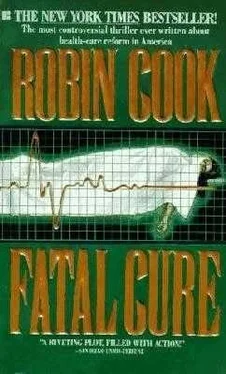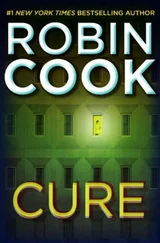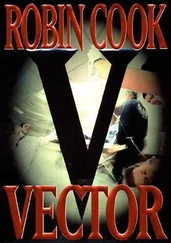"I don't believe you," Traynor said, breaking a shocked silence. But his voice lacked conviction. Cantor's sudden departure had unnerved him.
"This is not the time for debate," David said. "Everyone better get out of here," he added. "You've all been exposed to a serious amount of radiation. I advise you to call your doctors."
Traynor and the others exchanged nervous glances. Panic soon broke out as first a few and then the remaining board members, including Traynor, ran from the room.
David finished with the last apron and took the Geiger counter. Turning it on, he was dismayed to see that it still registered a significant amount of radiation.
"Let's get out of here," David said. "That's about all we can do."
Leaving the cylinder wrapped in aprons on the table, they went out of the conference room, closing the doors behind them. David tried the Geiger counter again. As he expected, the radiation had fallen off dramatically. "As long as no one goes in the conference room, no one else will get hurt tonight," he said.
He and Angela headed toward the lobby to collect Nikki. Just before they arrived David stopped.
"Do you think Nikki will be okay for a few more minutes?" he asked.
"In front of a TV she'll be fine for a week," Angela said. "Why?"
"I think I know how the patients were irradiated," David said. He led Angela back toward the patients' rooms.
Half an hour later they collected Nikki and went out into the hospital parking lot. They took the Cherokee back to Van Slyke's so that David could get the Volvo.
"Do you think there's any chance he could hurt anybody tonight?" David asked. He motioned toward Van Slyke's house.
"No," Angela said.
"I don't think so either," David said. "And the last thing I want to do is go back in there. Let's go to my parents'. I'm exhausted."
David got out.
"I'll follow you," he said.
"Call your mother," Angela said. "I'm sure she's beside herself with worry."
David got in the Volvo and started it up. He looked at Calhoun's truck in front of him and sadly shook his head.
As soon as they got on the main road, David picked up his cellular phone. Before he called his mother he called the state police. When he got an emergency officer on the line he explained that he wanted to report a very serious problem that included murder and deadly radiation at the Bartlet Community Hospital…
FOUR MONTHS LATER
David knew he was late as he pulled up to a modest house on Glenwood Avenue in Leonia, New Jersey. He jumped out of the car and ran up the front steps.
"Do you know what time it is?" Angela asked. She followed David into their bedroom. "You were supposed to be home at one and here it is two. If I could get here on time I think you could have too."
"I'm sorry," David said as he quickly changed his clothes. "I had a patient who needed extra time." He sighed. "At least now I have the freedom to spend more time with a patient when I think it's called for."
"That's all well and good," Angela said. "But we have an appointment. You even picked the time."
"Where's Nikki?" David asked.
"She's out on the sun porch," Angela said. "She went out there over an hour ago to watch the '60 Minutes' crew set up."
David slipped on a freshly laundered dress shirt and did up the buttons.
"I'm sorry," Angela said. "I suppose I'm anxious about this TV thing. Do you think we should go through with it?"
"I'm nervous, too," David said as he selected a tie. "So if you want to cancel, it's fine with me."
"Well, we've cleared it with our respective bosses," Angela said.
"And everyone has assured us that it won't hurt us," David said. "And we both feel the public ought to know."
Angela paused to think about it. "Okay," she said at last. "Let's do it."
David tied his tie, brushed his hair, and put on a jacket. Angela checked herself in the mirror. When they both felt they were ready, they descended the stairs and walked out onto the sun porch, blinking under the bright lights.
Although David and Angela were nervous, Ed Bradley quickly put them at ease. He began the interview casually, getting them to relax, knowing he would be editing heavily as usual. He began by asking them what they were currently doing.
"I'm taking a fellowship in forensic pathology," Angela said.
"I'm working with a large medical group at Columbia Presbyterian Medical Center," David said. "We're contracted out with several HMO organizations."
"Are you both enjoying your work?" Bradley asked.
"We are," David said.
"We're thankful we've been able to put our lives back in some sort of order," Angela said. "For a while, it was touch and go."
"I understand you had a difficult experience in Bartlet, Vermont," Bradley said.
Both David and Angela chuckled nervously.
"It was a nightmare," Angela said.
"How did it start?" Bradley asked.
David and Angela looked at each other, unsure of who should begin.
"Why don't you start, David?" Bradley said.
"My part of it started when a number of my patients began to die unexpectedly," David said. "They were patients with histories of serious illnesses like cancer."
David looked at Angela.
"It started for me when I began to be sexually harassed by my immediate superior," Angela said. "Then we discovered the body of a homicide victim entombed under our cellar steps. His name was Dr. Dennis Hodges, and he'd been the administrator of the hospital for a number of years."
With his usual clever questioning, Ed Bradley pulled out the whole sordid story.
"Were these unexpected patient deaths instances of euthanasia?" he asked David.
"That's what we thought initially," David said. "But these people were actually being murdered not through some misguided gesture of mercy, but to improve the hospital's bottom line. Patients with potentially terminal illness often use hospital facilities intensively. That translates to high costs. So to eliminate those expenses, the patients themselves were eliminated."
"In other words, the motivation for the whole affair was economic," Bradley said.
"Exactly," David replied. "The hospital was losing money, and they had to do something to stem the red ink. This was their solution."
"Why was the hospital losing money?" Bradley asked.
"The hospital had been forced to capitate," David explained. "That means furnish hospitalization for the major HMO in the area for a fixed fee per subscriber per month. Unfortunately, the hospital had estimated utilization at too low a cost. The money coming in was much less than the money going out."
"Why did the hospital agree to capitate in the first place?" Bradley asked.
"As I said, it was forced," David said. "It had to do with the new competition in medicine. But it's not real competition. In this case the HMO dictated the terms. The hospital had to capitate if it wanted to compete for the HMO's business. It didn't have any choice."
Bradley nodded as he consulted his notes. Then he looked back at David and Angela. "The new and current administrator of the Bartlet Community Hospital says that the allegations you're making are, in his words, 'pure rubbish.' "
"We've heard that," David said.
"The same administrator went on to say that if any patients had been murdered, it would have been the work of a single deranged individual."
"We've heard that as well," David said.
"But you don't buy it?"
"No, we don't."
"How did the patients die?" Bradley asked.
"From full-body radiation," Angela said. "The patients received overwhelming doses of gamma rays from a cobalt-60 source."
"Is that the same material that is used so successfully for treating some tumors?" Bradley asked.
Читать дальше












